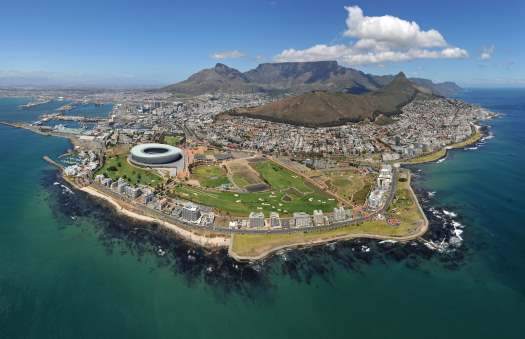
Judaism is Thriving in South Africa
South Africa is a captivating country that offers a multitude of experiences from wildlife spotting and whale watching to spectacular scenery.
Travelers can trace the history of humans with a visit to the caves at the Cradle of Mankind. They can ride a cable car to the top of Table Mountain in Cape Town or a hot air balloon ride. Visitors can also stand on a cliff at the Cape of Good Hope, the most southwestern point of the continent, and watch dozens of species of birds in flight or visit Boulders Beach and watch a colony of African penguins.
It is also the country where more than 60,000 Jews reside. On my recent visit, I met with Rabbi Ari Kievman, 31, spiritual leader of Chabad’s Goodness and Kindness Centre, (CGKC) shul and tourist center in Johannesburg. The rabbi said that the Jewish community has many opportunities to celebrate its Yiddishkeit in South Africa.
“There are about 50,000 Jews living in Johannesburg and about 11,000 in Cape Town,” Kievman said. “Most Jews belong to Orthodox synagogues and 90 percent of Jews send their children to Jewish day schools.”
The CGKC is located in the Sandton area of greater Johannesburg, near the City Center. It opened a year ago and an expansion is already being planned by the enthusiastic young rabbi.
“Our future plan is to build a children’s museum that teaches tolerance and acts of goodness,” Kievman said. “The building, a former church, is a heritage sight so we can’t change the structure, but are planning to build around it.”
The rabbi and his wife host dinners once a month for about 150 people and the rabbi and members of his congregation open their homes for visitors on the Sabbath.
“We have a unique, cosmopolitan Jewish community,” Kievman said. “There are 10 synagogues in Johannesburg, 25 kosher eateries, kosher butcher shops and plenty of kosher bakeries. We also have many Jewish concerts in addition to our Friday evening and Saturday morning services.”
The Chabad Centre also reaches out to seniors in the community.
“We have a Mitzvah Bus that picks up about 150 seniors every day. We serve them lunch and teach them technology skills, like how to use an IPAD so they can keep in touch with their families abroad,” Kievman said.
A must-see museum for first time visitors to Johannesburg is the Apartheid Museum. The museum describes the political turmoil beginning in the last century and the country’s segregation and oppression through film, photos, text and live accounts. The museum also documents the country’s struggle toward freedom and democracy. Jewish participants who opposed the apartheid government are recognized in the museum.
I was in South Africa one week before the death of Nelson Mandela, the first president of a democratic South Africa, but felt his presence throughout the nation.
A larger than life bronze statue of Mandela stands in the center of the Nelson Mandela Shopping Mall in Johannesburg. People stand in long lines to visit one of his former homes in Soweto, now a museum, in a suburb of Johannesburg. Hundreds more visit Robben Island where he was imprisoned for 27 years for opposing the policies of the Apartheid government. The prison, now a tourist attraction, is accessible by a 30-minute boat ride from Cape Town.
Cape Town is one of Africa’s most picturesque cities. Table Mountain sits on the top of the city. A revolving cable car takes visitors to the top of the mountain for a magnificent view of the city and the unusual experience of walking among the cloud formations at its summit.
Located not far from the parliament buildings in Cape Town is the Jewish campus which contains the South African Jewish Museum, the Holocaust Centre and the Gardens Shul, formerly the Cape Town Hebrew Congregation “Great Synagogue.” The campus also has a Jewish library and a well-stocked gift shop with many handmade Judaica items.
The Gardens Shul is the oldest congregation in South Africa. It was founded in 1841 and the current synagogue building was dedicated in 1905. Seating 1,400 worshippers, with a second story gallery, the magnificent, ornately decorated synagogue is a hub of daily activities. On my recent visit, the preschool was participating in a graduation ceremony with dozens of children, their teachers and parents assembled in the synagogue.
The multi-level South African Jewish Museum traces the history of South African Jews and has the replica of a typical village in Lithuania, the country of origin of most of the forefathers of contemporary South Africa Jewry on the lower level. An audio visual display on Nelson Mandela is also featured at the museum.
The Jewish campus is a wonderful way to spend a day in Cape Town.















Dov
Good work Kievmans. Keep it up
Dov
Good work. Kievmans. Keep it up
Out of Africa
Rabbi Kievman is doing great work, both with his Shul center and Seniors program!
Now, not to quibble with the general tone of the article, but a few corrections:
There are BE”H over 80,000 Jews in South Africa, with about 45 Shuls in Johannesburg. Many of these are official Chabad Shuls and many others are Ashkenazi, but led by Chabad rabbis. There is a wide-range of kosher products (without the confusing competing Kashrut organizations of most places). There is no lack of options for eating out, though twenty-five eateries sounds a bit on the high side.
60,000 Jews in SA?
I think it must be way more than that. Fact check please!